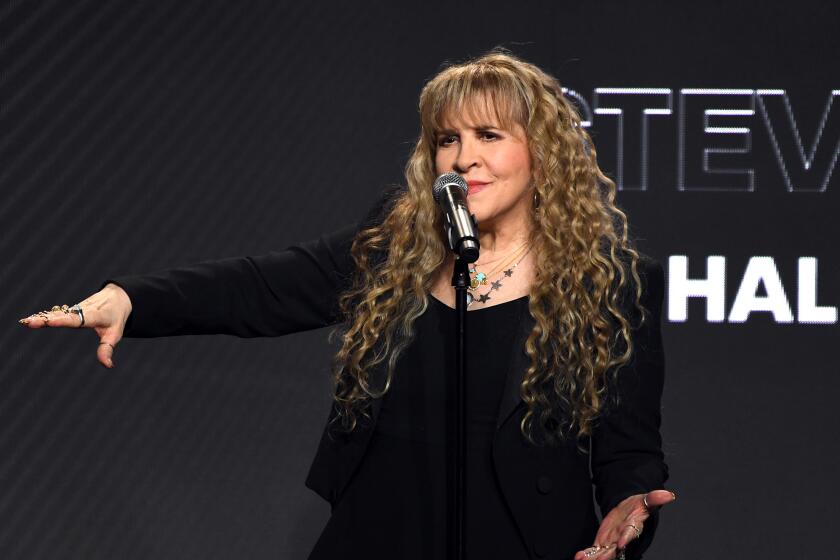Archive: Kaskade spinning in the sunshine
- Share via
Three Sundays ago, the electronica artist Kaskade flew into Las Vegas to spend a raucous afternoon spinning music at a poolside party at Steve Wynn’s uber-plush Encore hotel.
Pool clubs have become a prized means of monetization in Vegas, and the $70-million, 60,000-square-foot Encore Beach Club, redolent of a 1960s Saint-Tropez pleasure dome, aims to one-up its more prosaic rivals that have proliferated like palm trees along The Strip.
For roughly three hours, Kaskade laid down chill house dance grooves, mostly from his own growing six-album catalog, to a crowd of tanned and toned twenty- and thirtysomethings that swelled to 2,000, in a ratio of 35 men for every 65 women.
Nice work, if you can get it, and the Bay Area-based Kaskade, who was born Ryan Raddon 39 years ago in Chicago, is making the most of his, and electronica’s, moment in the sun.
“I don’t think 20 years ago [electronica] was really ready, it was still kind of in its infancy, the sound was working itself out,” says Kaskade, who’ll be one of the headliners at Friday’s opening of Electric Daisy Carnival, a two-day electronic music blowout at the L.A. Memorial Coliseum and adjoining Exposition Park that was founded by L.A. promoters Insomniac Events and last year drew 135,000 people.
“But now it’s matured,” Kaskade continues, “it’s more sophisticated now, it’s more musical than it’s ever been. So I think people, they can hear it and they can understand it.”
In many ways, Kaskade embodies electronica’s hard-won mainstream acceptance from fans, critics and the record industry. Despite his blooming celebrity and globe-hopping schedule, he’s a happily married man with three young children who retains the amiable, unassuming demeanor of a nice Midwestern guy from the Chicago ‘burbs.
The first thing to know about Kaskade and other velvet-rope-caliber electronica artists is that the term “DJ” is inadequate to encompass their activities and ambitions. Practitioners such as Moby, Deadmau5 and Armin Van Buren, all booked for Electric Daisy Carnival, are constantly in demand by top pop stars eager to remix their tunes and make them dance-ready.
But besides breaking others’ tracks down into components and reassembling them -- as he has done for a variety of artists, including Lady Gaga, Justin Timberlake and Britney Spears, among many others -- artists like Kaskade also write and produce their own songs. His latest disc, “Dynasty,” was released this spring on Ultra Records, while Kaskade kept up a steady pace of live shows from Coachella to Hong Kong.
Kaskade’s A-list collaborators include the Dutch DJ-impresario Tiesto and Deadmau5, who teamed up on two Kaskade signatures, “I Remember” and “Move for Me,” that you won’t fail to hear if you set foot inside a West Hollywood nightclub this summer. He’s especially well known for working with female vocalists who can transmit electronica’s growing penchant for melody, lyrics and complex emotion over pure rhythm.
“We’ve long surpassed the word ‘DJ,’ ” Kaskade says. “Do you call Daft Punk ‘DJs’? Of course not. Do you call Chemical Brothers ‘DJs’? It’s much more of a performance art.”
That might sound like a highfalutin term. But it fits the impression of Kaskade as he glides his fingers like a concert pianist across a battery of mixing boards, searching for the opportune beat or lyric that will keep the bodies swaying.
“It’s like a roller coaster,” says Sean Christie, operating partner of Encore Beach Club and its sister nightclub, Surrender, of Kaskade’s technique. “He builds you up, he drops you back down, he builds you back up. So you walk away at the end of the day having experienced all these different emotions.”
While the sun-worshipers gyrate around him at Encore, pumping their fists and hoisting their cocktail glasses, Kaskade, smiling behind sunglasses, waves his hands and sings along while sipping a Diet Coke.
That’s a far cry from electronica’s popular image in the early 1990s, at least in the United States, when it was depicted by much of the media as a noisy excuse for thrashing around until dawn at “rave” parties in an Ecstasy-induced stupor .
Kaskade remembers those times, as well as the disco backlash of the late ‘70s. Although he wonders if electronica may be reaching a similar saturation point, he believes that the availability of cheap technology will spur even greater innovation in electronic music. So too, he thinks, will the stressed-out tenor of our present age.
“It’s a very intense time, there’s so much going on in the world,” he says. “It seems like we’re inundated with information constantly. And that’s the entire thing of this music: It’s about celebration, letting go, kind of like embracing the moment.”
reed.johnson@latimes.com
More to Read
The biggest entertainment stories
Get our big stories about Hollywood, film, television, music, arts, culture and more right in your inbox as soon as they publish.
You may occasionally receive promotional content from the Los Angeles Times.











